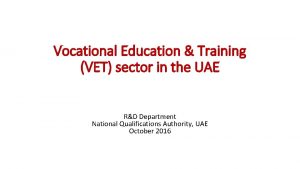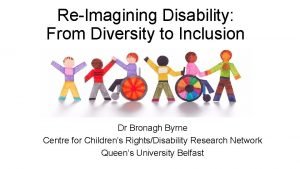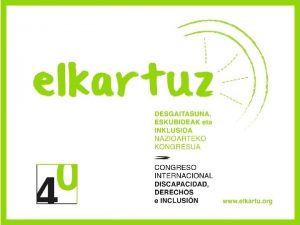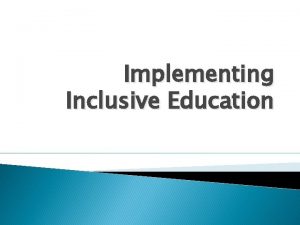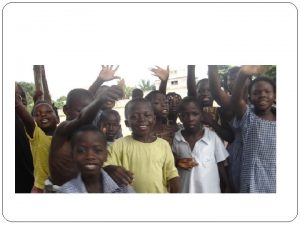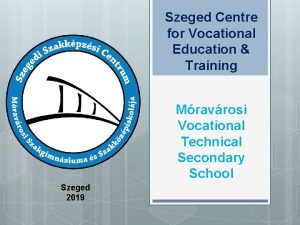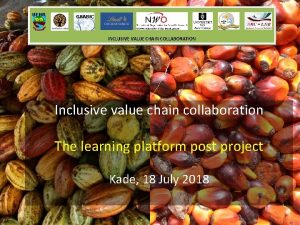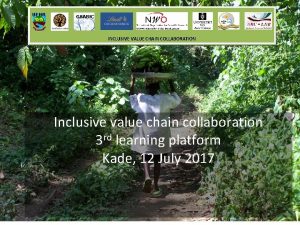SCHOOLS FOR INCLUSIVE EDUCATION Vocational Education and Training








- Slides: 8

SCHOOLS FOR INCLUSIVE EDUCATION Vocational Education and Training for Social Inclusion Lida Kita, European Training Foundation (ETF) 4 October, Urfa, Turkey

Potential candidate countries: Albania, Bosnia and Herzegovina, Kosovo (UNSCR 1244/1999), Montenegro, Serbia European Neighbourhood and Partnership Instrument countries ENP South: Algeria, Egypt, Jordan, Lebanon, Libya, Morocco, Occupied Palestinian Territory, Syria, Tunisia and Israel ENP East: Armenia, Azerbaijan, Belarus, Georgia, Republic of Moldova, Ukraine and Russia

Social vision and mission of VET External efficiency Internal efficiency: gover nance Innovation, partnership and civil society 1. VET policies, programmes and priorities 2. Tools to support policies: processes of evidence generation/ policy making and stakeholders’ participatory approach 1. Main social challanges 2. How the system is addressing them 1. Engineering: Inclusion of social exluded in the governance of VET policies 2. Incentives: Performance standards, Motivation/Reward 3. Public accountability: Performance Evaluation & Monitoring, voices at the national and local levels 1. Iinnovation and partnership in the system 2. Policies conducive to inclusiveness, innovation and partnership 3. Measures to support innovation and partnership 4. Obstacles for upscaling and mainstreaming innovation

Access and quality of secondary VET • VET system still not relevant to labour market needs, lack of comprehensive skills needs analyses to inform VET policy • VET system is considered the “marginalised” segment of the education system • Key competences not sufficiently promoted • Not enough evidence on social functions of VET • Cultural approaches and different national interpretations of the term “exclusion” are necessary in the design of VET policies and system • Weak links with enterprises and community

Current debate on VET Is VET and its role only to facilitate initial or re-entry into work- VET enhancing social inclusion through employability? 3 What is the role of VET other than professional formation and productivity: basic rights education and citizenship? New concept, promoted in the recent years; policy discourse and measures : policy statements of international agencies: EC, OECD, UNESCO, ILO etc,

• VET cannot be considered the panacea in combating problems of exclusion or lack of social cohesion • Some models in Europe support the idea that VET policies and practises can be more inclusive if the excluded are part of its policy design and governance • Civil society can play a central role through their pro-poor orientation, flexibility, innovation, cost-effectiveness, and participatory approaches by enabling participation of the marginalised groups in policy design and governance of the system • They reach the non-enrolled and dropouts and provide educational opportunities for hard-to-reach groups • We need to find out more how socially excluded can influence the nature of the delivery of VET through participatory

Content overview 1. Why VET and Social Inclusion and Social Cohesion 2. EU and Western Balkans and Turkey policy and practise developments 3. VET schools as holistic, integrated learning organisations: school development, partnership and participation, school management and leadership 4. Reflection on different approaches in different contexts: potential transferability of patterns and practices across the region

Comments for discussions • No shortage of new ideas and policy formulation but not enough creativity in implementations, instruments and measures • Engage communities in a different form of dialogue in which locals not just national elites are empowered • Consulting should not mean passive participation of the “elite” or “leaders” of the community or lip service to capacity building of local communities and NGOs • There is a need for persistent attention to large-scale capacity development and services delivery to the community • Transnational cooperation with a special focus on peer learning and mutual learning actions
